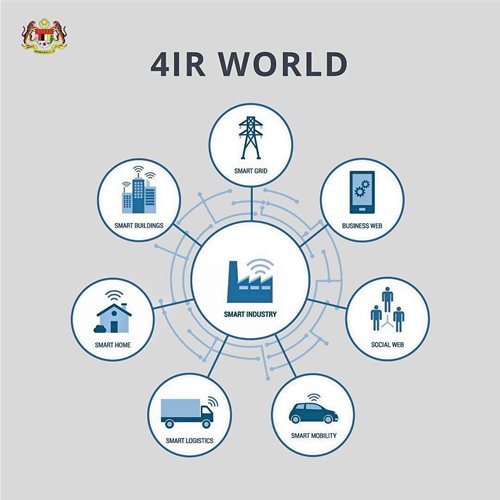The Star - MCMC Foresees Great Potential in 12th Malaysian Plan
When the 12th Malaysia Plan (12MP) was revealed on Sept 27, 2021, the Malaysian Communications and Multimedia Commission (MCMC) welcomed it wholeheartedly.
It provided for the support for digital economy growth and digital infrastructure and services strength.
It also listed plans to develop digital talents for the future.
Up to now, digitalisation advances were initiated via Malaysia’s national digital network plan Jalinan Digital Negara (Jendela), which was set up to bridge the digital divide between rural and urban areas while hastening digital innovation towards a developed digital economy.
Eventually, 3G will be phased out by the end of this year, to allow 4G to occupy the network spectrum.

The 5G push
By year end, 5G is expected to be launched to enhance online experience exponentially.
Initially planned for 2023, the impetus to bring forward the launch to the end of this year shows the urgency to adapt this technology for the economy.
Starting in Kuala Lumpur, Putrajaya and Cyberjaya by year end, the 5G rollout will spread to major cities in Selangor, Penang, Johor, Negeri Sembilan, Perak, Sabah and Sarawak by next year.
Coverage should reach other states in both urban and rural areas, covering 80% of the populated areas, by the end of 2024.
With the speeds 5G can offer, data transfer will be faster, nurturing a smarter society that leads to a more efficient lifestyle, such as simpler online learning and better communication in day-to-day affairs.
5G will enhance the nation’s capabilities in the Fourth Industrial Revolution, enabling the industry to take full advantage of artificial intelligence, robotics, big data, virtual reality and software engineering.
With these new technologies, the country can expect more investors who can create new, higher income jobs for Malaysians.
Power of data
No doubt with faster connectivity and access, data becomes a commodity that can generate wealth.
To this end, MCMC is collaborating with the Government and other agencies to map out an ecosystem that can support hyper data centres which offer hi-tech cloud computing services. These cloud computing services would not only be supporting the Malaysian economy but foreign ones as well.
To support hyper data centres, landing more international submarine cable to Malaysia is necessary in order to expand global connectivity.
Upgrades to the Internet Exchange Points (IXP), as well as adding more points, should improve data exchange efficiency.
The IXP ensures the Internet exchange traffic between service providers is smooth and the content delivery network is faster – reducing the need for upstream data transit, and reducing transmission costs.
Engaging ecosystem
All these efforts are a catalyst to create a conducive ecosystem that enhances Malaysia’s attractiveness as an investment destination.
It enables international companies to offer high value-added services in the global market.
The impact of this effort can be measured in terms of the percentage contribution to the country’s GDP which is targeted at 25.5% from the current level of 16.1% (Q2, 2021).
With a more developed ecosystem, Malaysians will also be able to seize the opportunities provided by the online marketplace, as well as increase the productivity of Malaysian workers.
To introduce, guide and strengthen the local digital economy for all walks of life, especially for the B40 group, 873 community Internet centres will be increased to target “one centre in each state legislative assembly constituency”.
The community Internet centres will be streamlined and modified to become the “Malaysian family digital centres” which will offer information and communication technology-based training facilities.
The centres will also train young and old alike on basic computer skills, while exposing them to pertinent information.
Empowering entrepreneurs
To drive entrepreneurship development, the Malaysian family digital centres will also run various digital entrepreneurship programmes aimed at helping budding business owners expand their skills and knowle dge towards a wider market – through ecommerce platforms.
Called Pemerkasaan Pendigitalan Usahawan Kecil (PUPUK), the programme started with PUPUK@AEON and PUPUK@Shopee. Currently 1,600 entrepreneurs are following PUPUK@Shopee and 100 will sign up with PUPUK@AEON by the end of the year.
Packaged proposal
MCMC has implemented Pelan Accelerator Kurier Negara (Pakej), which seeks to improve courier service quality and provide smoother coverage, targeting increased parcel delivery from 14 parcels per capita to 30 by 2025.
Among the Pakej’s initiatives is a comprehensive parcel delivery network with the addition of more collection and delivery centres nationwide called “pick-up, drop-off”.
The advantages of a central delivery and collection system designed for the courier services shows them to be faster and more efficient, improving consumer’s convenience when picking up ordered goods or purchases.
MCMC plans to add about 4,000 new collection and handover centre facilities each year, breaching a total of 30,000 centres by 2025. This is in addition to the existing 10,000 operating centres.
These extra efforts to strengthen online business or ecommerce will certainly contribute more than 10% to the digital economy.